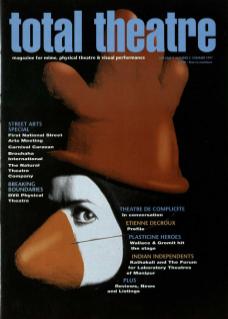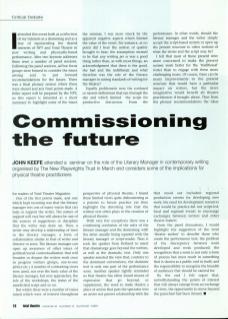I attended this event both as a reflection of my interests as a dramaturg and as a way of representing the shared interests of NPT and Total Theatre in new writing and physically based performance. After two keynote addresses there were a number of panel sessions. Following the panel sessions, ad hoc focus groups were formed to consider the issues arising and to put forward recommendations for the future. There was a final plenary session where these were shared and any final points made. A fuller report will be prepared by the NPT, so this report is intended as a short summary to highlight some of the issues for readers of Total Theatre Magazine.
One of the first points made, and one which kept recurring was that the literary manager was one of many voices that can help or support the writer. The nature of support will vary but will always be one of the sources of suggestions or discipline that the writer may draw on. Thus, a writer may develop a relationship of trust to the literary manager, a form of collaboration similar to that of writer and director or actor. The literary manager can open up awareness of other issues of political/social contextualisation that will broaden or deepen the writer’s work once in progress (writers groups, one-to-one advice, etc). A number of contrasting views were aired, not over the basic value of the literary manager, but over approaches, the role of the workshops, the status of the unsolicited script and so on.
But whilst there were a number of issues raised which were of interest throughout the seminar, I was more struck by the apparent negative aspects which limited the value of the event. For instance, at no point did I hear the notion of quality brought to bear; the assumption seemed to be that any writing per se was a good thing rather than, as with most things, an acknowledgement that there is the good, the bad and the indifferent and what therefore was the role of the literary manager in raising standards of writing for the theatre?
Equally problematic were the confused or narrow definitions that ran through the day and which limited the scope for productive discussion. From the perspective of physical theatre, I found these limited views quite disheartening as a pointer to future practice yet they highlight the distorting role that the written text often plays in the creation of physical theatre.
With very few exceptions there was a continuing confusion of the roles of the literary manager and the dramaturg; with the latter usually being equated with the literary manager or script-reader. Thus it took the speaker from Holland to assert that dramaturgy goes beyond the written, as well as the dramatic, text. Only one speaker asserted the view that, contrary to the dominant conventions, the dramatic text is only one part of the performance score. Another speaker rightly reminded us that theatre has often found means of expression that go beyond, or supplement, the word to make theatre a place of action that puts the spectator into an active not passive relationship with the performance. In other words, should the literary manager and the writer simply accept the script-based system or open up the present structure to other notions of what the writer and the script may be?
I felt that most of those present were more concerned to make the present system work better for the ‘traditional' writer than to engage with these more challenging issues. Of course, there can be many improvements to the present structure that would have a particular impact on writers, but the more imaginative would benefit all theatre practitioners if brought about. Thus from the plenary recommendations the ideas that stood out included: regional production centres for developing new work; the need for development resources that would be practice-led not script-led; local and regional events to encourage exchanges between writers and other theatre-makers.
From the panel discussions, I would highlight the suggestion of the term 'theatre author' to describe those who create the performance text; the problem of the discrepancy between work developed and work produced; the recognition that a work is not only a form of process but must result in something that is shown as a public end in itself; and the responsibility to recognise the breadth of audiences that should be catered for.
By the end I felt regret that, notwithstanding the points of interest that will always emerge from an exchange of views, the opportunity to move beyond the parochial had been missed.

